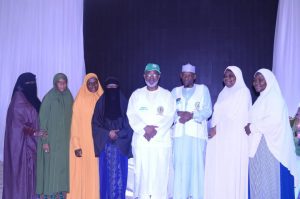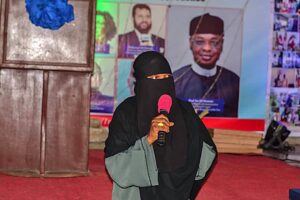The Amirah (President) of the Federation of Muslim Women’s Association of Nigeria (FOMWAN), Hajia Rafiah Idowu Sanni, has commended female members of the Ulamaa team, saying that there were testimonies about their dedication to duties to pilgrims during Hajj 2023.
Hajia Rafiah, who led the females of the Ulamaa team of the National Hajj Commission of Nigeria (NAHCON) to hajj made the revelation in an exclusive interview with Muslim News.
According to her, “This year, we are thankful to Allah for the success of the hajj exercise. It appears that we’re making improvements every year despite challenges. The female members of the Ulamaa team made our contributions too, as we assigned our members to various states for supervision and guidance. We got testimonies that pointed to the fact that the pilgrims were happy with our activities.”

Citing an example, the FOMWAN Amirah said, “I had somebody who said for 25 years she had been coming to hajj on a national platform, the education and awareness of this year as conducted by the Ulama team were more qualitative and bolstered her understanding of hajj. So, our education and sensitization campaigns were truly impactful. Alhamdulilah!
“We are also grateful that the essence of including females in the national Ulamaa team has not been defeated. If anything, it has been beneficial. If you assess the dressing of our pilgrims at this year’s hajj, you will observe a significant improvement. It has been improving over the years, but this year stands remarkable.”
Hajia Rafiah, while thanking NAHCON led by Alhaji Zikrullah Hassan for the opportunity to serve, expressed joy that the pilgrims paid keen attention to their admonitions during the hajj exercise, which she said had maximum impact on them.
“Our pilgrims were patient to listen to our admonitions at Muna and Arafat, and it impacted them to know that they were at Allah’s call. It was during hajj that some of our pilgrims expressed readiness to sacrifice on the path of Allah. We saw some countries that came with very young persons as volunteers sharing water, tissue paper, and dates to the Hujjaj. So, our sisters from Nigeria also wanted to partake in such volunteering.”

The head of the female Ulamaa team said there is a need for Muslims, young and old to be dedicated to learning about the religion, stressing that some pilgrims were oblivious of some elementary aspects of salat, including basic Quranic surahs.
“One of the takeaways which I think should serve as a wake-up call was that we experienced some of our sisters who confessed to not knowing Suratul Kaafirun when they were asked to perform nawafil at miqat. This shows that a lot of work still needs to be done because these are adult Muslims. I think we need to work on this as an Ummah. You’ll be surprised that some people don’t even know the tahleel we do at Arafat. We had to write it on paper for them and even tasked those who know to teach them. I think we need to look into it because these are fundamentals of our religion.
“It didn’t come as a huge surprise though. 10 years ago, we had to print these things and task our Da’wah officers to recite for the pilgrims so that they say after them. To this extent, we can say we’re recording progress because the number of those who did not know those wordings this year was not as bad as 10 years ago. But there is still room for improvement.
“Meanwhile, we are glad that our pilgrims now better understand the special issues that concern women on hajj such as menstruation and so on.
“We also took explanations on these matters further and they showed zeal in understanding them. This is the reason we have been deployed to hajj in the first instance, it’s therefore incumbent on us to deliver this responsibility to the best of our abilities.”

The Amirah lamented the lack of orientation on the part of some pilgrims, noting it was responsible for some misplaced complaints against NAHCON.
She said the Ulamaa team, therefore, did not limit their responsibilities to Islamic admonitions and guidance alone, as members had to guide pilgrims on social issues that would ease their hajj rites.
“This year, our team was also able to share so many stories that surround hajj with the pilgrims. These stories were mostly strange to them. They had to ask us to share contacts with them for further consultations about Islam after the hajj.
“Again, you find out that most people didn’t have enough awareness and orientation. This led to unnecessary complaints. An example is that of transport. We had people who didn’t know where to go to get buses deployed by the hajj commission to transport them. Our team was also able to educate pilgrims on some of these issues.
“So, our activities did not only center on Islam alone, but they also included other social issues that would make the hajj convenient for our pilgrims. We guided some of our pilgrims who took ill to the clinic. It’s only when they are healthy that they can listen to our admonitions and even partake in the demanding hajj activities. So, we added some of these social matters to our activities just to see the smooth operation of the whole exercise.

“Our team worked so hard that even pilgrims from other countries were looking up to have them at their tents. We pray that Allah accepts it from us.”
She said the team also played significant roles in appealing to the pilgrims over the unpleasant experiences at Muna where the shortage of tents and poor feeding were reported.
“During the operational setbacks at Muna concerning the shortage of tents and poor feeding, our team also empathized with the pilgrims. We called for their endurance and cited the experience of our progenitors at hajj who had to travel miles then and barely enjoyed the comfort we have access to today. We told them to see these setbacks as a test of faith. It’s part of the endurance test of hajj. It’s just for a short period. Alhamdulilah, people understood our message and they endured,” she said.
“Meanwhile, I also saw that people appreciated our explanation on standing at Arafah. We took our time to tell them that after the khutbah, zuhr and asr prayers, the Prophet (SAW) would stand and offer supplication. We, however, noted that people who were not so capacitated to stand for long could sit to rest and offer their supplication. They were truly happy with our explanations because many didn’t know this before and they had been going for hajj.”
The Amirah also disclosed that the team led special prayers for development and security in Nigeria, urging the people to desist from raining curses on the country.
“We also offered special prayers at Arafat for our country Nigeria and its leaders, including President Bola Ahmed Tinubu and Vice President Kashim Shettima. We urged our pilgrims not to curse the country or the leaders but to continue offering prayers for them. May Allah accept our efforts from us and forgive our shortcomings,” she noted.



